Fallen Angel

Brief Synopsis
Cast & Crew
Otto Preminger
Alice Faye
Dana Andrews
Linda Darnell
Charles Bickford
Anne Revere
Film Details
Technical Specs

Synopsis
One night, drifter Eric Stanton is forced to disembark a San Francisco-bound bus because he has not paid the full fare. Eric is let off in the small town of Walton, and when he goes to Pop's, a local diner, he finds Pop distraught over the disappearance of his beautiful waitress Stella. Retired police detective Mark Judd assures Pop that Stella will return, and soon she does appear, much to Pop's relief. Eric then leaves and, after seeing a poster for a show by "psychic" Professor Madley, convinces Madley's assistant, Joe Ellis, that he is friends with the professor. Ellis confides that ticket sales have been slow due to the influence of Clara Mills, the former mayor's daughter, who has been telling her friends not to attend. Seeing an opportunity to make money, Eric goes to the Mills house the next morning, and asks the cynical Clara to give the professor a chance. Clara dismisses Eric, saying that the professor is a charlatan, but her lovely younger sister June is intrigued by Eric, and tells Clara that Madley is merely trying to make a living. June convinces her sister to buy tickets to the show, and soon many of the townspeople follow suit. When Madley arrives in Walton, he reveals that he does not know Eric, but is nonetheless so pleased with his work that he pays him and offers him a job touring with the show. Eric accepts, then continues his pursuit of the sensuous Stella. At the show that night, Clara is horrified when Madley, pretending to speak in the voice of her late father, reveals how she was swindled by a smooth-talking man, even though she still has $25,000 of her inheritance left. After the show, Eric goes out with Stella, and although he pressures her to make love with him, she insists that she wants marriage and a home. Annoyed that Stella will not come to San Francisco with him when he joins the professor, Eric prepares to leave alone, but is so obsessed with Stella that he stays in Walton and promises her that he will find enough money to marry her. Eric then begins to court June, flattering her and goading her into dating him. June is captivated by Eric's charm, but he is infuriated when he sees Stella with jukebox vendor Dave Atkins. When Eric confronts Stella later, she shows him a new watch that she has received from a beau, although she does not specify which one. The next night, Eric goes out with June again and talks about her potential career as a musician and asks to take her to San Francisco for a concert. June falls asleep without answering, and the frustrated Eric begs Stella to run away with him, but she insists that he first obtain the money he promised. Eric goes to sleep but is awakened by a phone call from June, who asks him to accompany her and Clara to San Francisco in the morning. Clara, who is putting June's share of their inheritance in a safe deposit box, is suspicious of the glib Eric, but later that afternoon, when June and Eric reveal that they have been married, Clara reluctantly agrees to accept Eric for June's sake. When they return home, however, Eric sneaks out to see Stella, but is followed by Clara. Stella is angered by Eric's marriage, despite his assurances that he will have it annulled as soon as he gets June's money. Stella storms off, and the next morning, June confronts Eric with Clara's revelation about his meeting with Stella. Eric tries to defend himself, but June further reveals that Judd is there to question him, as Stella was murdered late the previous night. Clara tells Judd, who has been placed in charge of the investigation, that Eric was at the Mills home all night, after which Eric watches as Judd brutally beats Atkins while questioning him. Atkins admits that Stella had agreed to marry him but denies giving her the watch that was dropped by the killer as he fled the scene. Atkins' alibi holds, and Judd then turns his suspicions on Eric, who, afraid that he will be framed, flees to San Francisco. June, who loves her husband despite the evidence against him, accompanies him, and while they are talking in their hotel room, Eric finally begins to appreciate June's gentle, loving nature. Judd has June arrested when she tries to withdraw her money from the safe deposit box, but June maintains her belief in Eric's innocence. Eric grows suspicious of Judd and makes his own inquiries, after which he returns to Walton, where he confronts Judd in Pop's diner. Eric presses Judd into confessing that he gave Stella the watch and later killed her after she agreed to marry Atkins because she was tired of waiting for Judd to obtain a divorce. Wild with grief, Pop attempts to shoot Judd, but Eric stops him and the policeman is arrested. Eric tells Pop that he, too, will get over Stella, then joins June, who is waiting outside.

Director

Otto Preminger
Cast

Alice Faye

Dana Andrews

Linda Darnell

Charles Bickford

Anne Revere
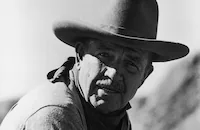
Bruce Cabot

John Carradine
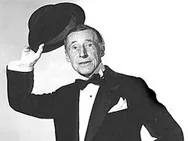
Percy Kilbride
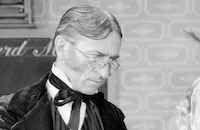
Olin Howlin
Hal Taliaferro
Mira Mckinney
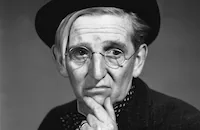
Jimmy Conlin
Gus Glassmire
Leila Mcintyre
Betty Boyd
Garry Owen
Horace Murphy
Martha Wentworth
Paul Palmer
Paul Burns
Dave Morris
Herbert Ashley
Stymie Beard
William Haade
Chick Collins

J. Farrell Macdonald
Harry Strang
Max Wagner
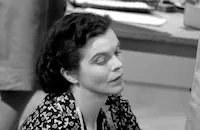
Dorothy Adams
Crew
Lloyd Ahern
Charles Althouse
Teresa Brachetto
Otto Brower
Bonnie Cashin
Tom Dudley
Bernard Freericks
Leland Fuller
Kermit Goell
Sol Halprin
Helen Hansard
Harry Kleiner
R. A. Klune
Joseph La Shelle
Harry M. Leonard
Thomas Little
May Morris
Paul Neal
Emil Newman
Ben Nye
Otto Preminger
David Raksin
David Raksin
Harry Reynolds
Frances C. Richardson
George Schaefer
Fred Sersen
Edward Snyder
Murray Spivack
Lyle Wheeler
Sam Wurtzel

Photo Collections
Videos
Movie Clip




Trailer
Hosted Intro
Film Details
Technical Specs

Articles
Fallen Angel (1945) - Fallen Angel
Darnell, realizing she would have a limited shelf life portraying sweet young things in costume dramas, wanted meatier roles. She got one by way of Summer Storm (1944), Douglas Sirk's adaptation of the Chekhov novel, The Shooting Party. As a lusty Russian peasant girl who devours George Sanders' aristocrat, marketed with copious publicity shots showing Darnell posing in a hayloft in a peasant blouse and little else, she became one of World War II's most popular pin-up girls. Zanuck, sensing the money to be made from her dark voluptuousness and smoldering sensuality, elevated her to Fox's first rank of femmes fatales. Enter Otto Preminger.
Preminger's reward for filming the noir hit Laura (1944) was to be ordered by Zanuck to do it again. Being asked to repeat himself was met with muted enthusiasm by Preminger, but he set to work, taking advantage of one of the studio system's plusses - the ability to quickly and efficiently re-assemble a production team whose collaboration had proved fruitful. Thus Preminger re-enlisted cinematographer Joseph LaShelle, composer David Raksin, art directors Leland Fuller and Lyle Wheeler, set decorator Thomas Little, costume designer Bonnie Cashin, second unit director Tom Dudley and three other team members, insuring that behind the camera all would be working from the same page.
The loose cannon was Zanuck, or, rather the ongoing tug of war between Zanuck and the film's top-billed star, Alice Faye. A decade-long string of musicals had turned her into one of Fox's most bankable stars. She had amassed enough clout that Zanuck had to keep her happy. Faye, like Darnell, wanted a change of pace, a chance to prove she had dramatic chops. She also had, in effect, script approval. A studio press release said she turned down 35 scripts before settling on Fallen Angel, presumably with an eye to Laura. Exercising her right to choose her leading man, she chose Laura star Dana Andrews. Also mindful of Raksin's hit song (and theme) from that film, she insisted he write her a song, too. He showed up with several. She chose one called "Slowly."
Faye might have naively chosen the role of June Mills because she's so saintly, not realizing the character would come across as slightly insipid. In Laura, Andrews played the cop. In Fallen Angel, he plays Eric Stanton, a glib drifter, thrown off a bus in a California coastal town because he's literally down to his last dollar. Conning himself into a hotel room, he walks into a shack-like diner, where Darnell has already wrapped around her little finger the owner (Percy Kilbride in slavish, scrawny hayseed mode), the guy who services the jukebox (Bruce Cabot in experienced commercial traveler mode) and the local cop (Charles Bickford, stonily playing out his police career after years in New York). Stanton, too, falls under her brassy spell.
She reciprocates his interest, but she's been bruised enough by experience to know she's only got so many years left to find a snug harbor. She can't afford another deadbeat, she tells him frankly. After briefly hooking up with John Carradine's engagingly breezy phony mind reader, he targets Faye's spinster daughter and heiress (with her suspicious sister, also a spinster) and romances her, scheming to separate her from her money so he can run off with Darnell's pouty, sometimes waspish, but oh-so-luscious Stella. Faye's June is the church organist (the church seems an airless sepulcher, reinforcing the cloud of genteel suffocation hanging over the sisters like a shroud). This woman, too, is on the wrong side of the biological time clock.
For a woman with a lifelong interest in classical music, June harbors a credibility-demolishing degree of naiveté. It may be attributed to her interest in the fast-talking stranger who approaches her during a solo practice in church and compliments her on her way with Beethoven, Brahms and Bach, that she lets pass the obvious fact that his knowledge of music is nonexistent. Later, when he wants to lure her to San Francisco to get her money from a safe deposit box in a bank there, he offers to take her to hear Arturo Toscanini conduct the San Francisco Symphony (he never did) and later get Toscanini to listen to her musicianship. All the while Darnell's Stella is cooling her heels (or not) in her shanty-like backstairs room that would be on the wrong side of the tracks if the town had tracks.
What's wrong here is obvious. Faye's character is a cardboard cutout of goodness, patience, forbearance and love, refusing to entertain the idea that there's anything questionable about the churlish man she impulsively marries, despite his shifty and downright mean treatment of her. Andrews does a good job of playing a man who has lost his inner compass, taking refuge in cynicism or the short-term superficial betterment of the grab-and-run thief. His tendency to flee his difficulties is amplified when he finds himself facing a murder rap. The moral blurriness, weakness and ambivalence Andrews could muster serve him well in noir.
But Faye, whose warmth and appeal created a simpatico bond between her and audiences for years, falls conspicuously short, partly because she isn't given enough shadings and dimension by the script and, if she's to be believed, butcher-block editing. The professionalism surrounding the principals is solid down the line. Anne Revere, who with Judith Anderson and Agnes Moorehead, was one of Hollywood's three queens of frosty severity, is a big plus as June's dubious sister, and Bickford knows how to use silence as the hard-nosed cop sitting in the diner watching, watching.
It isn't just by forfeit that Fallen Angel becomes Darnell's film. Her Stella is the only character who seems all of a piece. She could have been a cliché, just another trashy, tough-talking small town siren. But Darnell's ability to project vulnerability from beneath her tough exterior lifts her beyond the usual stereotypical tropes. The ripeness of which so much was made wasn't just physical with her. She persuades us that it included the heart, too, as she traversed the dark precincts of LaShelle's evocation of the visual essence of noir. Partly because she initially lacked confidence, Darnell's on-set behavior during most of her career was described by co-workers as polite and even sweet. She was to make, in addition to Fallen Angel, three other films with Preminger: Centennial Summer (1946), in which she vied with Jeanne Crain for the favors of Cornel Wilde to a Jerome Kern score; Forever Amber (1947), for which she dyed her hair blonde as the heroine of Kathleen Winsor's then-scandalous costume novel; and The 13th Letter (1951), which moved Henri-Georges Clouzot's poison-pen-letter classic, Le Corbeau (1943), to Canada. By the time of her last film with him, she loathed the dictatorial Preminger as much as so many others did. But her films with him are as strong a grouping as any in her oeuvre, which was cut sadly short when she died in a house fire at the age of 41 in 1965.
Although now largely forgotten, Fallen Angel stands high among Darnell devotees. In a burst of wishful thinking, the Fallen Angel ad campaign trumpeted: "The creator of 'Laura' does it again!" He didn't. Its choppy script and ham-handed editing do the film in. While there's lots of satisfying professionalism on display in Fallen Angel, the film itself comes up conspicuously short. Musically, "Slowly" was no "Laura." Faye, after recording it, was shocked to discover that her version wasn't used. Instead, the song was sung in the film by Dick Haymes. Further distressed by the way Zanuck and Preminger had cut her scenes and played up Darnell's, Faye stormed out of the studio and didn't make another film for 16 years. On her way out, Faye was to write, she left Zanuck a note she described as unprintable. Faye learned the hard way how the Hollywood power game works. As it turned out, the real noir elements in Fallen Angel were to be found behind the camera, not in front of it.
Producer: Otto Preminger
Director: Otto Preminger
Screenplay: Harry Kleiner; Marty Holland (novel)
Cinematography: Joseph La Shelle
Art Direction: Leland Fuller, Lyle Wheeler
Music: David Raksin
Film Editing: Harry Reynolds
Cast: Alice Faye (June Mills), Dana Andrews (Eric Stanton), Linda Darnell (Stella), Charles Bickford (Mark Judd), Anne Revere (Clara Mills), Bruce Cabot (Dave Atkins), John Carradine (Professor Madley), Percy Kilbride (Pop).
BW-98m.
by Jay Carr
Sources:
AFI Catalog of Feature Films
Hollywood Beauty: Linda Darnell and the American Dream, by Ronald L. Davis, University of Oklahoma Press, 1991
Alice Faye: A Life Beyond the Silver Screen, by Jane Lena Elder, University Press of Mississippi, 2002
Otto Preminger: The Man Who Would Be King, by Foster Hirsch, Knopf, 2007
IMDb

Fallen Angel (1945) - Fallen Angel
Fallen Angel - Otto Preminger's FALLEN ANGEL - 1945 Film Noir on DVD
Dana Andrews plays a drifter who steps off the bus in small town with a dollar in his pocket and not much else. Looking to make a few bucks, he learns that a phony spiritualist (John Carradine) is coming to town and sweet-talks his way into becoming his de facto publicist. Meanwhile, Andrews hangs out at Pop's Cafe, a second-rate diner that's popular with the local men because of the waitress who works there - stunningly sultry Linda Darnell. Andrews falls head over heels but Darnell wants money to go along with her man, so Andrews concocts an only-in-the-movies scheme: He will charm his way into the life of Alice Faye, a sweet yet prim woman who lives with her even primmer sister, marry her in order to get his hands on her money, then divorce her and run off with Darnell. A sudden murder, however, throws the scheme off balance and everything into question.
What makes Fallen Angel a film noir is its claustrophic, seedy atmosphere and the sense of desperation for sex and money that drives Andrews to his behavior. The two women, blonde Faye and brunette Darnell, represent the light and dark sides of Andrews's soul - a device that is used to even greater depth in the excellent noir Raw Deal (1948). It's a thoughtful way of delving into Andrews's character and it does somewhat make up for the film's overall credibility problem. Also making up for it is Preminger's fluid direction. His staging of crowd scenes is spectacular though almost invisible, with some gorgeous dolly and crane shots. By presenting scenes in one or two takes, Preminger is asking audience members to watch the story and make up their own minds about characters and motivations. The effect is to keep the audience in the action continuously.
While Alice Faye was the far bigger star in 1945, it's Linda Darnell as a knockout of a tough dame who steals Fallen Angel. This was clear at the time, too, and did not sit well with Faye. The top musical star at Twentieth Century-Fox, Faye had recently given birth to her second child and taken a year off from movies (with the exception of a cameo in Four Jills in a Jeep, 1944). When she was ready to return, she decided that she wanted to do something different, a non-musical. Studio chief Darryl Zanuck was so anxious to get her back on screen that he allowed her to reject over 30 scripts before settling on Fallen Angel. According to Faye biographer Jane Lenz Elder, Zanuck even let her choose her leading man. Dana Andrews hated the script, calling it "unbelievable" and "in bad taste," but did the film when he was threatened with suspension. He and Preminger also weren't thrilled to be assigned a musical star for this dark drama, but such was the clout of Faye's stardom.
Knowing that audiences expected to see Alice Faye sing, no matter the movie, Zanuck had composer David Raksin report to Faye to let her choose the melody for the song which would play a prominent role in the film. Raksin arrived on set one day with three or four tunes, played them for Faye, and she chose the one she liked best. Only then did Kermit Goell write the lyrics for the song "Slowly," which is heard on the cafe's jukebox over and over and is the Darnell character's favorite song. There was a sequence filmed where Andrews and Faye are driving and the song comes on the radio. Faye says "oh, that's my favorite song," and sings it aloud as they drive.
That scene was left on the cutting room floor. When Faye saw the movie at a studio screening, she was devastated that it had been cut - and that the rest of the film had been edited such that emphasis was given more to Linda Darnell. Faye was so angry and hurt that she marched out of the screening room, wrote a note to be delivered to Zanuck the next day, and immediately drove off the lot, not to return for 17 years. She never publicly revealed the contents of the note, telling an interviewer years later only that it was unprintable. "I was terribly upset. I felt the film had been ruined, and feeling utterly at a loss I left the studio. I didn't even go to my dressing room to collect my personal belongings." According to one source, Faye said that it was because Zanuck and Darnell were having an affair that Zanuck beefed up Darnell's part. Be that as it may, Faye would not appear in another movie until State Fair (1962).
Fox's DVD of Fallen Angel is clean and beautiful and comes with plenty of interesting extras. There are lots of stills, including several for a seemingly alternate ending. Joining Fox DVD regular Eddie Muller on his commentary track is Susan Andrews, daughter of Dana Andrews, and she adds much interest to the conversation. For instance, she recounts how her father hitchhiked from Texas to L.A. "with a fedora and a camel hair coat" - and a Texan accent, which he worked hard to lose. Over seven years he worked in L.A. as a bus driver, beekeeper, movie usher, accountant and gas station attendant, before hitting it big as an actor. No one ever wore a fedora better than Andrews, she says at one point. Truer words were never spoken.
Fox Film Noir will return in June, 2006, with Boomerang! (1947), House of Strangers (1949) and I Wake Up Screaming (1941).
For more information about Fallen Angel, visit Fox Home Entertainment. To order Fallen Angel, go to TCM Shopping.
by Jeremy Arnold
Fallen Angel - Otto Preminger's FALLEN ANGEL - 1945 Film Noir on DVD
Quotes
Trivia
Notes
In the film, Alice Faye recites the following poem: "We were born to tread the Earth as angels-to seek out Heaven this side of the sky. But they who race alone shall stumble in the dark and fall from grace. Then love alone can make the Fallen Angel rise-for only two together can enter Paradise." According to information in the Twentieth Century-Fox Records of the Legal Department, located at the UCLA Arts-Special Collections Library, Marion Parsonnet worked on an early version of the screenplay. The extent of her contribution to the completed picture has not been determined, however. A September 12, 1944 Los Angeles Examiner news item reported that Joan Fontaine was being considered for one of the lead roles, while in February 1945, Hollywood Reporter announced that Ida Lupino would play the role of "June Mills." In March 1945, Hollywood Reporter noted that Anne Baxter would be co-starring with Linda Darnell. Although studio press releases and a Hollywood Reporter news item include Paul Power, Stuart Holmes and Broderick O'Farrell in the cast, their appearance in the released film has not been confirmed. The legal records list the following California locations at which scenes in the film were shot: the Ocean Park Bowling Center in Ocean Park; the California Bank at the corner of Vine St. and Hollywood Blvd. in Hollywood; Sycamore Pier in Malibu; the city of Orange; and San Francisco. A June 1945 Hollywood Reporter news item noted that filming had ended in Palos Verdes, CA. Several reviews compared the picture to Laura, a 1944 Twentieth Century-Fox production that was also directed by Preminger, starred Dana Andrews, and featured music by David Raksin and photography by Joseph La Shelle.
A May 13, 1945 New York Times article reported that Alice Faye was cast in Fallen Angel after a contract dispute with Twentieth Century-Fox, in which she won the right to appear in only one picture per year, for which she would have full script approval. Faye fought to be cast in the picture because she wanted to appear in a drama rather than a musical, according to New York Times. According to contemporary sources, Faye was to sing the song "Slowly." The number was instead recorded by singer Dick Haymes, whose voice is heard on the jukebox and radio in the film. According to modern sources, Faye was angered when studio production chief Darryl F. Zanuck ordered her rendition of the song, as well as several of her dramatic scenes, cut from the picture in order to emphasize Linda Darnell's role. Consequently, Faye left Twentieth Century-Fox without fulfilling the rest of her contract, which called for the making of two more films. Fallen Angel was Faye's first picture since the 1943 film The Gang's All Here, (although she did make a brief singing appearance in 1944's Four Jills and a Jeep); it was her first and only purely dramatic role; and was her last film until the 1962 picture State Fair, for which she returned to Twentieth Century-Fox (see AFI Catalog of Feature Films, 1961-70; F6.4688). On June 17, 1946, Lux Radio Theatre presented a broadcast of Fallen Angel starring Darnell, Maureen O'Hara and Mark Stevens.
















